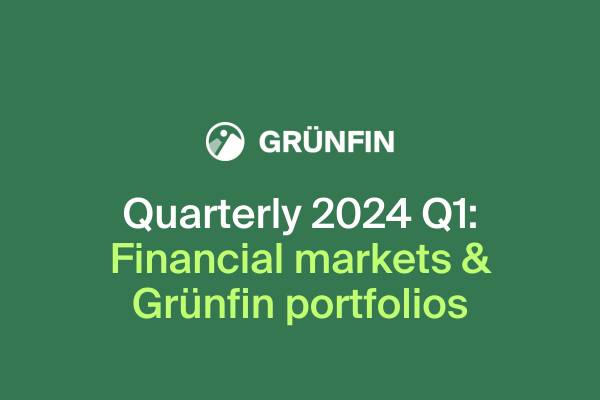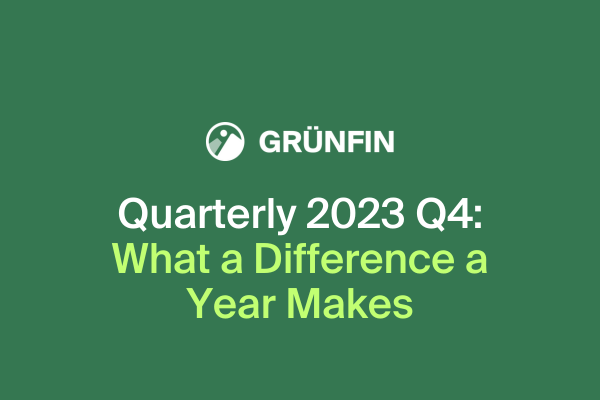The song “What a Difference a Day Makes” conveys that change can happen within a brief time span. My favorite part is “What a difference a day made…24 little hours…brought the sun and the flowers, where there used to be rain.”
Investors seemingly feel the same way, but instead of a day, it’s a year.
Markets performed really well in 2023. The US S&P 500 and MSCI Europe stock indices finished up 26,3% and 15,8%, respectively. Bonds gained 7,2% as per the Bloomberg Euro Aggregate index.
These returns were all significantly above historical averages.
Now jump in a time machine, travel back to a year ago and talk to investors. The mood was very pessimistic. The S&P 500 and Euro bond index had fallen by roughly 18% in 2022. Investors were nervous and many were selling.
Therefore, in our newsletter from a year ago, we reminded investors that “prosperity eventually triumphs over the bad” and that “trying to time markets is a strategy likely to fail”.
We also said, “We believe the best strategy is to continuously invest new savings and over a long-term horizon.”
Indeed, continuously investing new money was the right strategy.
Investors caught on. What a difference a year makes.
So what exactly happened in 2023?
Inflation was excessively high as the year began and central banks were increasing interest rates to the highest levels in decades. By raising interest rates, central banks hoped to reduce demand for money, which then lowers inflation.
This approach worked. Inflation began normalizing and sparked optimism that interest rate cuts are coming. Lower interest rates should eventually help the economy, consumers, businesses and corporate profits.
We acknowledge that 2023 wasn’t all “sun and flowers”, as the song goes.
Estonia and Germany slumped to economic recessions, Russia’s aggression in Ukraine continued and two major financial institutions, Credit Suisse and Silicon Valley Bank, went bankrupt.
However, the US economy roared with impressive growth thanks to a strong consumer and low unemployment. Plus, China eased its Covid restrictions which reopened its economy.
We know the S&P 500 is barely positive over a two-year period and bonds have yet to fully recover losses from 2022. This said, we have been following markets for a long time and are continuously optimistic about the market’s power to rise over time.
How’s 2024 looking?
Inflation in Europe and the US is at around 3%, the sweet spot for the stock market historically.
The S&P 500 has risen by 13,8% in years when inflation is between 2-3%.
Major financial institutions like Goldman Sachs, Bank of America, J.P. Morgan and Citibank are optimistic about stocks and bonds for 2024.
Although some expect an economic slowdown and even mild recession in the US due to the delayed effect of high interest rates, these scenarios are likely factored into today’s prices. Markets are forward-looking and likely focused beyond these concerns and assume an eventual resurgence of growth.
Estonia and Germany are expected to exit their recessions and resume economic growth in 2024.
Also, expect noise regarding the US presidential election this November. Just remember that the US economy and stock market have grown regardless of which political party holds the presidency, as shown in our recent blog article.
What was the performance of stocks aligned to the Paris Climate Agreement?
Sustainable investing has many themes and angles. However, solving climate change is likely the biggest challenge of all. Therefore, we support companies aligned with the Paris Agreement goal of lowering greenhouse emissions to net zero by 2050 to control global warming.
Stocks aligned to the Paris Agreement outperformed the general stock market in 2023, showing once again that it is possible to make money through companies doing good for the world.
What about activism?
The bigger the company, the bigger the impact on the planet. This is why activism, the act of influencing companies on their sustainability behaviors, is so important.
We met with more than 20 major global companies last year from Pepsi to BASF to BNP Paribas as part of our coalition with ShareAction.
You too are creating change because we represent you in these meetings.
Here are a few of last year’s highlights.
Societe Generale:
This French bank financed US$ 98 billion of fossil fuels between 2016-2022, making it one of the largest oil & gas lenders in Europe.
Therefore, we met with its Chief Sustainability Officer and she confirmed a stop to all financing of new oil & gas projects. This is an incredible win and, you may remember, that we sent Societe Generale this letter back in February specifically requesting this. They listened to you!
Unilever:
Its products are used by 3,4 billion people every day. Unilever bears significant responsibility for both nourishing people and its environmental impact. Malnutrition and obesity affect roughly 3 billion people, while food production causes 18% of greenhouse gas emissions worldwide.
Therefore, we met with its Global Head of R&D Nutrition and Unilever reconfirmed the following commitments:
- Grow its plant-based food business by 25% to €1,5 billion in annual sales by 2025.
- Reach nutritional healthiness on 85% of its food portfolio by 2028.
- Achieve net zero emissions across its value chain by 2039, way ahead of the Paris Agreement deadline.
Nestle:
As the world’s largest food company, Nestle has an enormous responsibility for what it feeds people.
After many meetings, Nestle met our request to report the healthiness of its entire global food portfolio for the first time, disclosing that roughly half of it is healthy (products with a HSR of 3.5+ are healthy - see pg 39 of its sustainability report).
It’s a huge win in transparency, as step one. We will continue pushing the company to set targets to increase sales of healthier products, including more plant-based items, as step two.
Lastly, here’s an exciting one for 2024.
Yara:
As the world’s leading crop nutrition company and provider of agricultural solutions, it matters that Yara is using too much natural gas over greener energy sources when producing ammonia, a key component in fertilizers.
We met with Yara’s VP of Sustainability Governance and were disappointed that the company was not forthcoming in setting new sustainability targets or making further disclosures.
Therefore, we sent a letter to Yara’s CEO as part of the ShareAction coalition. If his response is not positive, potentially we will either:
- File a resolution against the company ahead of the 2024 annual shareholder meeting; and/or
- Request a meeting with the Norwegian government to discuss its role as the major shareholder at Yara International. Norway is highly supportive of the green transition, so this should apply to its ownership of Yara as well.
These could also be interesting to you

Quaterly news from Grünfin 2024 Q3
Quarterly (q3, 2024) updates about the financial markets, news, and your portfolio performance.

Quaterly news from Grünfin 2024 Q2
Quarterly updates about the financial markets, news, and your portfolio performance.

Quaterly news from Grünfin 2024 Q1
Grünfin quaterly news about financial markets and Grünfin sustainable portfolios.
